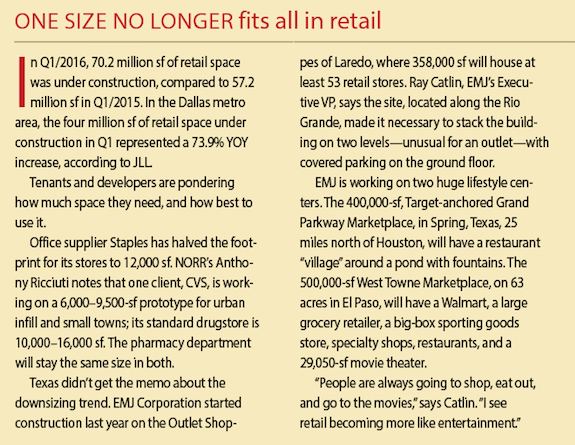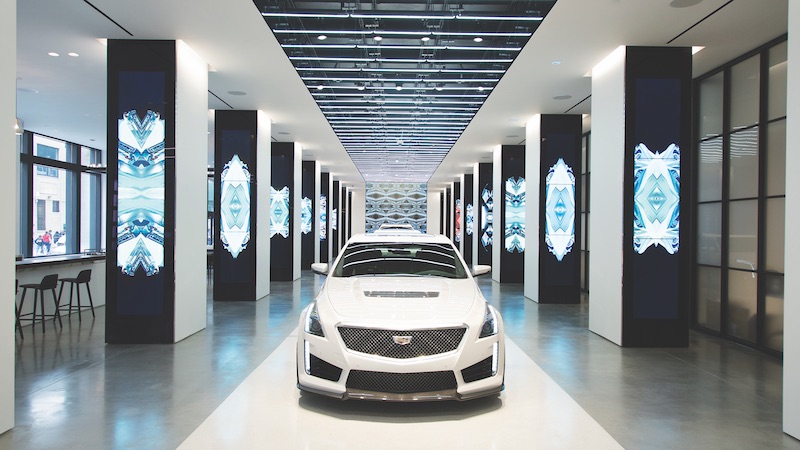When it debuted, in 1988, Fashion Mall, Plantation, Fla., was your typical anchor-driven retail leviathan. When it closed, in 2006, Fashion Mall was typical of huge shopping centers' fall from grace with many customers. Its prospects for resurrection, though, brightened last year, when Encore Capital Management acquired the property and announced plans to spend $300 million to turn it into Plantation’s new town square, dubbed 321 North.
TOP 90 RETAIL ARCHITECTURE FIRMS
Rank, Firm, 2015 Revenue
1. CallisonRTKL $205,964,000
2. Gensler $129,680,000
3. GreenbergFarrow $49,719,540
4. MG2 $45,652,293
5. Stantec $39,933,013
6. FRCH Design Worldwide $38,017,500
7. WD Partners $38,000,000
8. MBH Architects $28,126,062
9. NORR $20,326,054
10. P+R Architects $20,000,000
TOP 80 RETAIL CONSTRUCTION FIRMS
Rank, Firm, 2015 Revenue
1. VCC $574,787,663
2. PCL Construction Enterprises $556,581,503
3. Whiting-Turner Contracting Co., The $553,062,362
4. Shawmut Design and Construction $349,000,000
5. EMJ Corp. $287,137,603
6. Hoar Construction $235,377,000
7. dck worldwide $204,462,000
8. Turner Construction Co. $195,934,217
9. Beck Group, The $185,064,042
10. W.E. O’Neil Construction Co. $174,093,120
TOP 50 RETAIL ENGINEERING FIRMS
Rank, Firm, 2015 Revenue
1. Jacobs $167,960,000
2. Henderson Engineers $50,149,210
3. WSP | Parsons Brinckerhoff $33,622,000
4. Wiss, Janney, Elstner Associates $21,580,000
5. Core States Group $13,874,811
6. KLH Engineers $9,139,313
7. Wallace Engineering $8,200,000
8. Arup $7,105,331
9. Shive-Hattery $6,168,437
10. Highland Associates $5,900,000
Encore will bulldoze most of the mall, leave a nearby hotel and parking garage standing, and construct a 100,000-sf office tower, two apartment buildings totaling 700 units, and 73,000 sf of new retail space.
In its latest Retail Investment Forecast, Marcus & Millichap singles out the enhanced value of malls that can be repositioned as “lifestyle centers.” For instance, A/E firm NORR is working on a 300,000-sf project in Detroit that will include 25,000 sf of retail, fast-casual restaurants, a hotel, and apartments, says NORR VP Anthony Ricciuti, RA, OAA, NCARB.
Developers see malls as “part of a cocktail that creates a destination,” says Matt Billerbeck, AIA, SVP in CallisonRTKL’s Seattle office. His firm’s “Mall of the Future” report describes successful malls as walkable, transit accessible, anchored by food and experience, mixed use in nature, and connected to shoppers via smartphone and Internet-of-Things technology.
Successful retail is “more engaged with life on the street,” says Susanne Pini, HDR’s Director of Retail and Mixed-Use Practice. She points to the 864,000-sf, $200 million Woologong Central shopping center, 55 miles south of Sydney, Australia. Since its opening in 2014, 34 bars and restaurants have sprouted around it.
TECHNOLOGY: the ENEMY becomes the ENABLER
The National Retail Federation estimates total retail sales will increase 3.1% in 2016 over last year. But bricks-and-mortar dealers continue to struggle, as evinced by bankruptcies (Sports Authority, Aeropostale) and bleak earnings reports (Macy’s, Nordstrom, Target). Online sales, now 7.7% of the total, could hit 11% by 2018, predicts Forrester Research.
But dealers that once saw the Internet as a threat are finding ways to use technology. NORR’s Ricciuti says the Eastern Market in the Delta terminal at Detroit’s Metropolitan Airport is installing a “virtual maitre d,” an interactive hologram that will provide travelers with information and directions.
“Technology and mobility have created a new paradigm, in which stores and online shopping represent a single strategy to reach customers,” says Margaux Jaffa, VP, VOA Associates. Online dealers Amazon, Warby Parker, and Birchbox are opening stores, following Apple’s wildly successful example.
“It’s all about the experience,” says Jim Scarpone, Director of Business Development, Shawmut Design + Construction. A recent Shawmut project—Ralph Lauren’s three-story, 38,000-sf Polo flagship store in New York—is piloting RFID-enabled fitting rooms and touch-screen mirrors that sync with the store’s inventory and point-of-sale systems.
The mirrors, devised by Oak Labs, read bar codes on clothing tags. Numbers pop up on the mirror and shoppers can call up item details, and try different colors and styles. Requests for help are delivered via iPad to an associate, who can send a text that appears on the mirror with his or her name and photo.
The Oak Interactive Fitting Rooms can also provide dealers with tons of customer and inventory management data.
Shawmut just completed work on Cadillac House, in New York’s SoHo district. The 12,000-sf auto dealership and showroom opened June 2. It has an incubator space for designers, a coffee bar, a runway, and an art gallery. “It’s not just about selling cars,” says Scarpone, “it’s about selling the brand.”

RETURN TO THE GIANTS 300 LANDING PAGE
Related Stories
Architects | May 2, 2024
Emerging considerations in inclusive design
Design elements that consider a diverse population of users make lives better. When it comes to wayfinding, some factors will remain consistent—including accessibility and legibility.
K-12 Schools | Apr 30, 2024
Fully electric Oregon elementary school aims for resilience with microgrid design
The River Grove Elementary School in Oregon was designed for net-zero carbon and resiliency to seismic events, storms, and wildfire. The roughly 82,000-sf school in a Portland suburb will feature a microgrid—a small-scale power grid that operates independently from the area’s electric grid.
AEC Tech | Apr 30, 2024
Lack of organizational readiness is biggest hurdle to artificial intelligence adoption
Managers of companies in the industrial sector, including construction, have bought the hype of artificial intelligence (AI) as a transformative technology, but their organizations are not ready to realize its promise, according to research from IFS, a global cloud enterprise software company. An IFS survey of 1,700 senior decision-makers found that 84% of executives anticipate massive organizational benefits from AI.
Codes and Standards | Apr 30, 2024
Updated document details methods of testing fenestration for exterior walls
The Fenestration and Glazing Industry Alliance (FGIA) updated a document serving a recommended practice for determining test methodology for laboratory and field testing of exterior wall systems. The document pertains to products covered by an AAMA standard such as curtain walls, storefronts, window walls, and sloped glazing. AAMA 501-24, Methods of Test for Exterior Walls was last updated in 2015.
MFPRO+ News | Apr 29, 2024
World’s largest 3D printer could create entire neighborhoods
The University of Maine recently unveiled the world’s largest 3D printer said to be able to create entire neighborhoods. The machine is four times larger than a preceding model that was first tested in 2019. The older model was used to create a 600 sf single-family home made of recyclable wood fiber and bio-resin materials.
K-12 Schools | Apr 29, 2024
Tomorrow's classrooms: Designing schools for the digital age
In a world where technology’s rapid pace has reshaped how we live, work, and communicate, it should be no surprise that it’s also changing the PreK-12 education landscape.
Adaptive Reuse | Apr 29, 2024
6 characteristics of a successful adaptive reuse conversion
In the continuous battle against housing shortages and the surplus of vacant buildings, developers are turning their attention to the viability of adaptive reuse for their properties.
AEC Innovators | Apr 26, 2024
National Institute of Building Sciences announces Building Innovation 2024 schedule
The National Institute of Building Sciences is hosting its annual Building Innovation conference, May 22-24 at the Capital Hilton in Washington, D.C. BI2024 brings together everyone who impacts the built environment: government agencies, contractors, the private sector, architects, scientists, and more.
Mass Timber | Apr 25, 2024
Bjarke Ingels Group designs a mass timber cube structure for the University of Kansas
Bjarke Ingels Group (BIG) and executive architect BNIM have unveiled their design for a new mass timber cube structure called the Makers’ KUbe for the University of Kansas School of Architecture & Design. A six-story, 50,000-sf building for learning and collaboration, the light-filled KUbe will house studio and teaching space, 3D-printing and robotic labs, and a ground-level cafe, all organized around a central core.
Sports and Recreational Facilities | Apr 25, 2024
How pools can positively affect communities
Clark Nexsen senior architects Jennifer Heintz and Dorothea Schulz discuss how pools can create jobs, break down barriers, and create opportunities within communities.

















